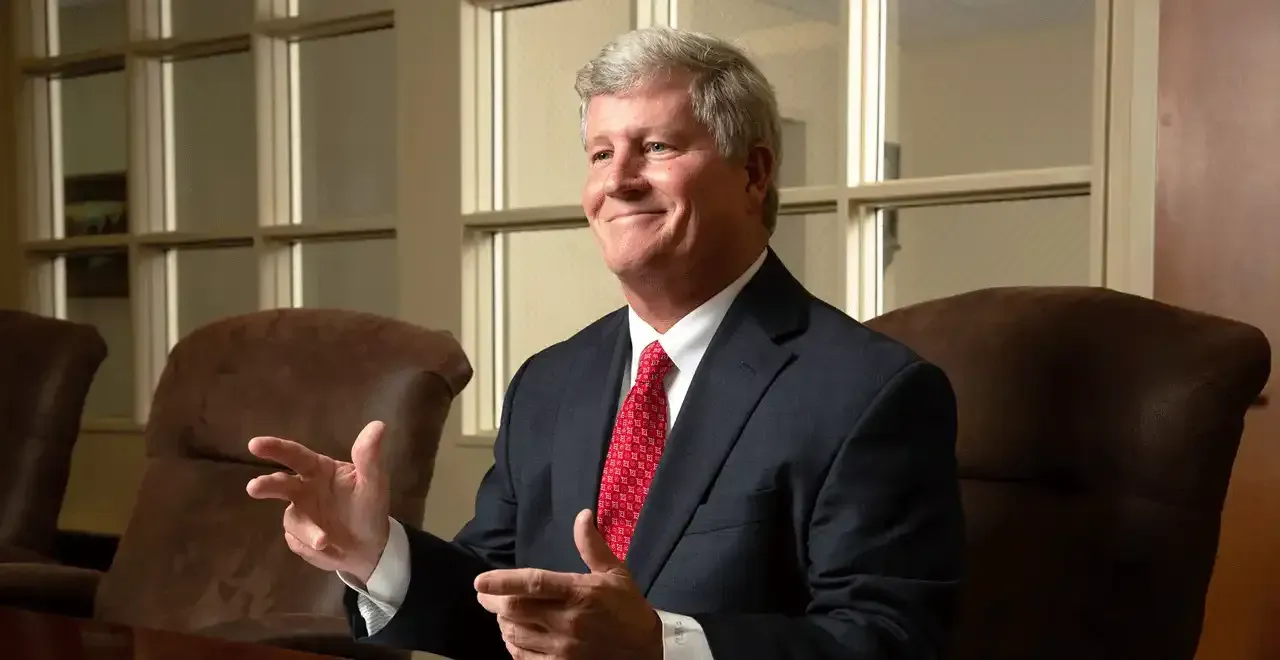A popular and effective mediator, Phillip McCallum brings experience, creativity, and credibility to the mediation table. Litigation attorneys and their clients appreciate Phillip's ability to build relationships and rapport with people from all walks of life.
Phillip brings to every mediated dispute a wealth of experience in litigation and in business and organizational management in facilitating valuable problem-solving for individuals and businesses.
The Birmingham native and past president of the Alabama State Bar attended Auburn University, graduated from the University of Alabama in Birmingham, and received his law degree from Cumberland School of Law. He is admitted to practice law in Alabama, Texas, Oklahoma, and West Virginia, and he is a member of the Alabama Academy of Attorney Mediators.
Phillip's value as a mediator is enhanced by his experience in leading a successful trial firm and in litigating disputes on behalf of both businesses and individuals. That experience provides a solid foundation for his effectiveness in achieving settlement in a wide variety of areas, including:
Phillip has also been very active in giving back to his community through his pro bono leadership and civic and charitable causes
(listed below).
Phillip's case manager, Lacey McCaleb, will contact you on receipt of your Appointment Request.
Does your preferred date appear to be booked? Please contact Lacey at her office number 256-734-3542, ext. 6, by her cell number 205-495-1299, or by
email
to see whether we can accommodate your schedule.
Phillip McCallum on mediation and arbitration
(articles coming soon)
January 23, 2026
One of the most common—and costly—mistakes in mediation is treating every case the same. Not every dispute needs the same structure, the same agenda, or even the same format. Yet too often, mediation is approached as a one-size-fits-all event rather than a custom-designed process . The best mediations are not run. They are engineered . Why Process Design Matters Every case is different: Some are emotionally charged. Some are technically complex. Some involve many parties and decision-makers. Some are simple—but politically difficult. If you use the same mediation structure for all of them, you’re guaranteed to leave value on the table. Good process design reduces: Posturing Fatigue Mistrust And wasted time And increases: Decision quality Efficiency And the likelihood of resolution Key Questions That Should Shape the Process Before mediation day, I spend time answering questions like: Who actually has authority to settle? Do the parties need to hear each other—or be separated immediately? Is this a case about money, or about something else? Would pre-mediation calls help narrow issues? Is this better handled in person, virtual, or hybrid? The answers to these questions should determine the structure , not the other way around. Examples of Custom Process Design A multi-party case may need phased negotiations instead of one long day. A highly emotional case may benefit from early private sessions before any joint discussion. A technically complex dispute may require pre-mediation issue framing or expert summaries . A decision-maker-heavy case may need staggered attendance instead of everyone waiting all day. The Mediator’s Real Value A mediator’s value is not just in facilitating conversations . It’s in designing a process that makes good decisions possible . When the process fits the problem, people negotiate differently. They listen differently. They decide differently. Mediation should never feel like forcing a case into a template. The best results come when the process is built around the case—not when the case is forced into the process.
January 15, 2026
Most lawyers begin every case with the same goal: to serve their client’s best interests. But over time, in long and hard-fought litigation, something subtle—and dangerous—can happen. The case slowly stops being about the client’s problem and starts becoming about the lawyers’ battle. I see this more often than many would like to admit. How It Happens Litigation is, by design, adversarial. It rewards: Strong positions Aggressive advocacy Winning motions And proving the other side wrong None of that is inherently bad. But when a case stretches on for months or years, it’s easy for the focus to shift from “What’s best for the client?” to: “We can’t give in now.” “After everything we’ve fought over?” “We’ve already invested too much.” At that point, sunk cost replaces strategy. The Warning Signs You can often tell when a case has crossed this line: Settlement discussions are framed as “concessions” instead of solutions Every issue becomes a matter of principle The emotional temperature in the room is higher than the financial one The client’s business or personal goals fade into the background When that happens, litigation stops being a tool and starts becoming the objective. The Real Cost Clients don’t measure success in motions won or briefs filed.They measure it in: Time Stress Money Disruption And uncertainty When a case becomes lawyer-centered instead of client-centered, those costs quietly multiply. The Mediator’s Role One of the most important roles of a mediator is to recenter the conversation : What does the client actually need? What problem are we trying to solve? What does a good decision look like today—not two years from now? Good mediation is not about declaring winners. It’s about helping people make clear, forward-looking decisions in imperfect circumstances. Final Thought Strong advocacy is essential.But the best lawyers never lose sight of who the case is really for. When litigation stays client-centered, resolution becomes possible.
January 8, 2026
Every lawyer has seen it: a strong case, good facts, capable counsel, and enough money on the table to resolve it. And yet—it doesn’t settle. When cases like this fail to resolve, it’s rarely because the law is unclear. More often, it’s because human decision-making is far less rational than we’d like to believe. Here are the most common reasons good cases still don’t settle: 1. The Case Has Become About Identity, Not Risk Over time, cases stop being about exposure and start being about being right . Lawyers and clients alike can become emotionally invested in the narrative. When that happens, settlement begins to feel like surrender—even when it’s objectively the best business decision. 2. Fear of Regret Outweighs Fear of Loss Many parties don’t evaluate settlement based on expected value. They evaluate it based on what they’ll feel if they’re wrong . “What if we settle and the jury would have given us more?” “What if we pay this and could have won?” This fear of future regret often freezes decision-making more effectively than any legal argument. 3. Anchoring Has Quietly Taken Over The first serious number in a case—whether a demand, a reserve, or an early valuation—often becomes psychological gravity . Even when new information emerges, parties stay tethered to old numbers long past their usefulness. 4. The Process Rewards Fighting, Not Resolving Litigation trains people to: Defend Attack Win motions Prove points It does not train people to make good resolution decisions under uncertainty . By the time mediation arrives, many parties are excellent litigators—but poor risk managers. 5. The Last 10% Is Emotionally Harder Than the First 90% Most deals fail near the finish line . Why? Because the final concessions feel personal, not mathematical. The closer you get, the more each move feels like a loss instead of a solution. The Mediator’s Real Job A mediator’s job isn’t just to move numbers. It’s to help people make decisions in the presence of fear, pride, fatigue, and uncertainty . Good cases don’t settle because they’re good. They settle because the decision-makers are ready to decide. Final Thought If a “good case” isn’t settling, the obstacle is rarely legal. It’s human.
Show More
American Bar Association
Alabama State Bar: Past President (2012-2013)
Alabama Academy of Attorney Mediators
Birmingham Bar Association
National Conference of Bar Presidents
Southern Conference of Bar Presidents
"Mediation: Mistakes to Avoid - Beginning to End" (CLE webinar co-presenter), Alabama Defense Lawyers Association, April 18, 2023
"Mistakes to Avoid from Beginning to End in ADR/Mediation" (CLE webinar co-presenter), Birmingham Bar Association, October 28, 2022 | Member comments
Alabama, 1988
Texas, 2002
Oklahoma, 2003
West Virginia, 2004
J.D., Cumberland School of Law, Samford University, 1987
B.S. (Political Science), The University of Alabama at Birmingham, 1984
Vestavia Hills Parks and Recreation Foundation: Past Board Member
City of Vestavia Hills Substance and Abuse Committee: Past Chair
Triumph Services: Past Board Member
Vestavia Hills Club Wrestling coach
While we function effectively via Zoom or other online settings, our conference rooms provide a peaceful, comfortable setting for your in-person mediation or arbitration. Take a virtual tour.









